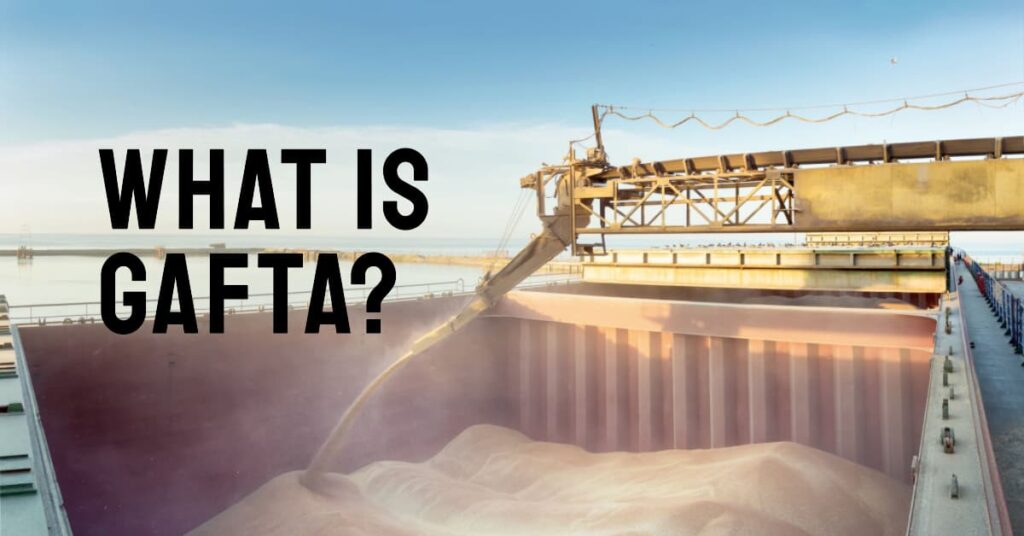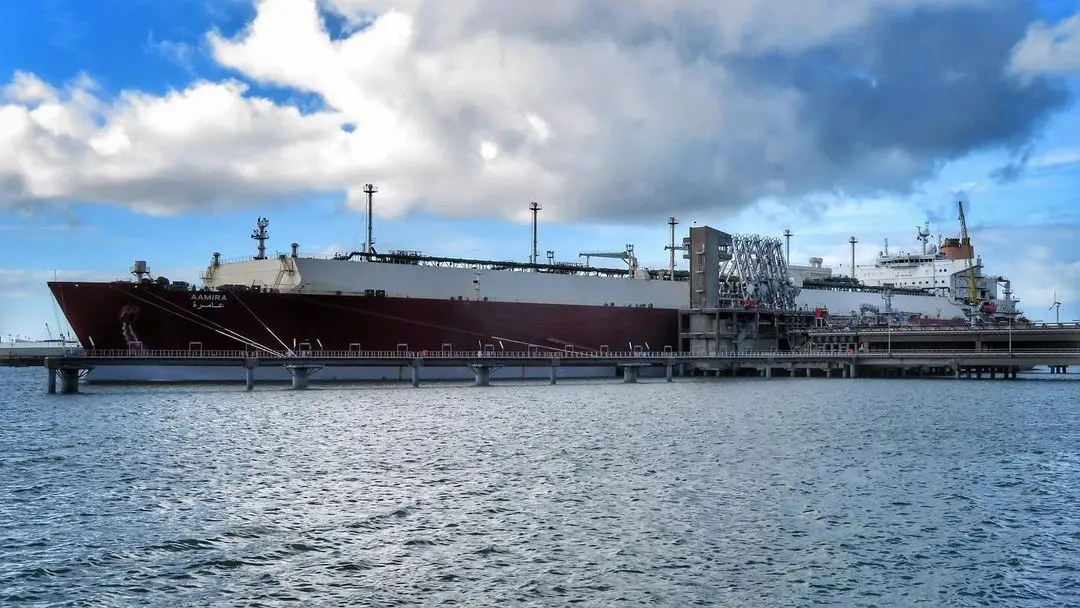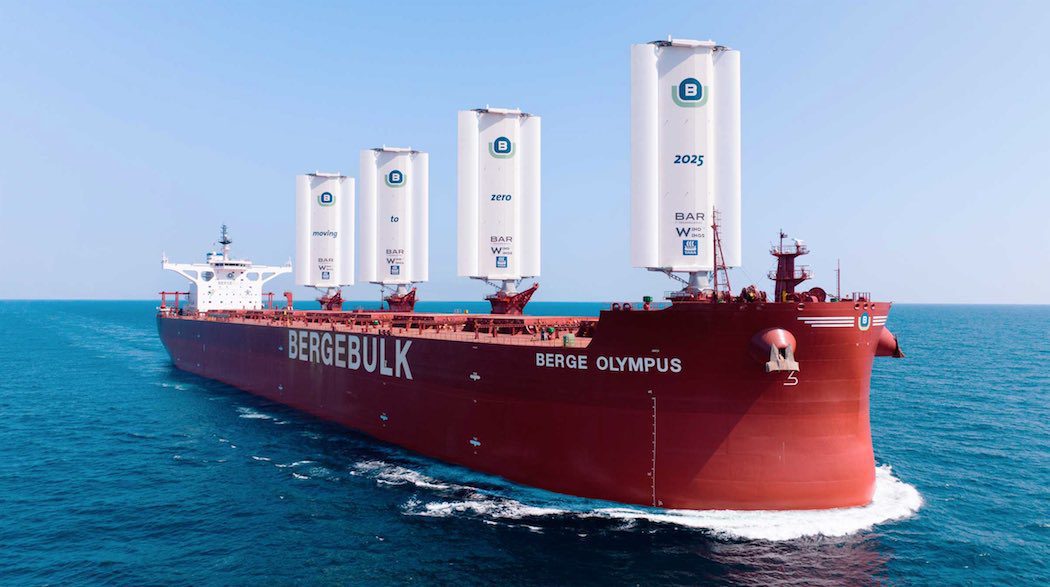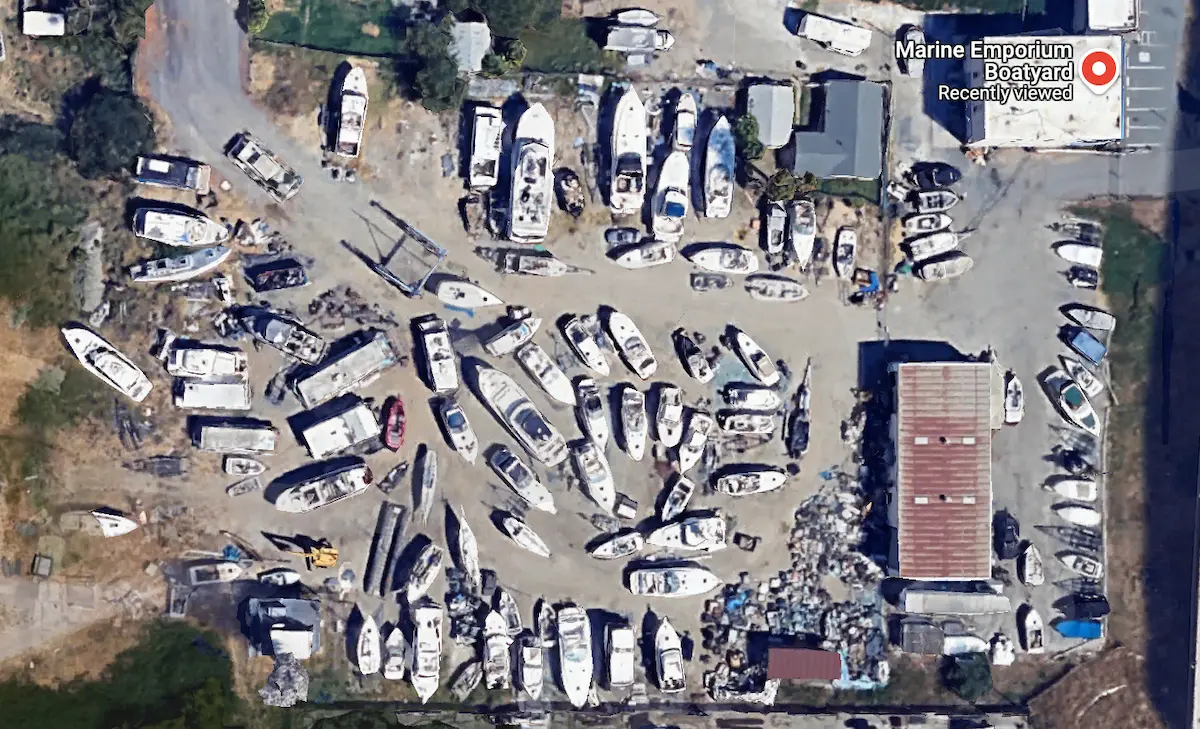The Grain and Feed Trade Association (Gafta) is an internationally recognized trade organization established to promote and facilitate global trade of agricultural commodities, spices, and general produce.
With over 1,900 members in 100 countries, Gafta is dedicated to protecting the interests of traders, brokers, superintendents, analysts, fumigators, arbitrators, and other professionals in the international grain trade by providing support through contracts, arbitration, trade assurance, policy, professional training, and networking events.

Through its rich history, Gafta has developed a comprehensive range of standardized contracts and forms specifically designed to facilitate easy and efficient trade between all actors involved in the agricultural commodity space.
Additionally, the organization offers arbitration and dispute resolution services, along with analysis and inspection services to ensure quality control and accuracy in the trade of these goods. Gafta regularly organizes educational events and specialized training programs for its members in order to maintain the community’s knowledge and growth.
Key Takeaways
- Gafta is an international trade association that protects members’ interests in the grain and agricultural product trade
- The organization offers standardized contracts, arbitration, and support services for efficient trade and dispute resolution
- Gafta emphasizes professional education and training through networking events and programs for its members around the world
History of Gafta
The Grain and Feed Trade Association (Gafta) has a rich and diverse history, stemming from its beginnings in the early 20th century. Gafta is an international trade association with over 1900 members in 100 countries, aiming to promote international trade in agricultural commodities, spices, and general produce while protecting its members’ interests worldwide.
Gafta’s roots can be traced back to two separate organizations in London, the London Corn Trade Association (LCTA) and the London Cattle Food Trade Association (LCFTA). These associations functioned independently, focusing on the interests of their respective industries. However, over time, members from both organizations recognized the potential benefits of unifying their efforts to better serve the needs of the grain and feed trade as a whole.
In the early 1970s, merger talks between the LCTA and LCFTA commenced, driven by shared goals and interests in the agricultural commodities sector. These talks culminated in the formation of the Grain and Feed Trade Association, or Gafta, in 1971.
The newly-formed Gafta quickly established itself as an essential institution within the global grain and feed industry. Since its foundation, the association has played a vital role in facilitating trade, providing arbitration services, and ensuring the protection of its members across the globe. Gafta also offers a range of professional development opportunities for members through training and educational programs, empowering them to stay ahead in the ever-evolving agricultural sector.
Overall, the history of Gafta is marked by collaboration, growth, and the unwavering commitment to promoting and protecting the interests of its members within the international grain and feed trade.
Membership and Roles
Members
Gafta, the Grain and Feed Trade Association, is an international trade association with over 1,900 members spanning 100 countries. Its primary aim is to promote international trade in agricultural commodities, spices, and general produce, while also protecting the interests of its members. Membership in Gafta is based on country location and is open to various entities, including traders, professionals, and those engaged in the trade.
Superintendents
Superintendents in Gafta are responsible for overseeing the quality and quantity of goods being traded. They are key players in ensuring that operations within the association run smoothly and efficiently, contributing to the overall reliability of the trade process.
Analysts
Analysts play a crucial role in Gafta by examining market trends and generating valuable data. Their expertise in interpreting this data is vital for members to make informed decisions regarding trade, pricing, and market fluctuations.
Arbitrators
Dispute resolution is an essential aspect of international trade, and Gafta provides a platform for arbitration. Arbitrators in Gafta are responsible for settling disputes between members and ensuring that all resolutions are fair and in line with the association’s rules and regulations.
Fumigators
Ensuring the quality and safety of stored commodities is of utmost importance in the trade of grain and feed products. Fumigators in Gafta are responsible for maintaining these standards by managing pest control and taking necessary measures to preserve the quality of the traded goods.
Brokers
Brokers act as intermediaries in Gafta, facilitating trade transactions between buyers and sellers. They play a vital role in ensuring seamless and efficient trade by assisting with the negotiation process, providing valuable market insight, and fostering long-term relationships between members.
Through a diverse range of roles and expertise, Gafta supports its members in achieving their trade objectives while maintaining high ethical and practical standards within the agricultural commodities industry.
Trade Function
Commodities Trade
The Grain and Feed Trade Association (GAFTA) plays a crucial role in promoting international trade among commodities, particularly within the agricultural sector. As a platform for trade and dispute resolution, GAFTA establishes contracts, arbitration procedures, and trade policies to streamline business activities between member countries.
Agricultural Commodities
GAFTA covers a wide range of agricultural commodities, including grains, oilseeds, and pulses. By setting trading standards and guidelines, the organization ensures transparent and ethical practices in the trade of agricultural goods between its members.
Animal Feedingstuffs
Animal feedingstuffs are an essential aspect of the agricultural commodities market. GAFTA provides a framework for the trade of animal feed, such as soybean meal, grain byproducts, and other commodities used in animal nutrition. This framework ensures that the trade of animal feed is conducted fairly and transparently among member countries1.
Grain
Grain trade is a significant focus within GAFTA, as many of the member countries have robust agricultural sectors that produce and export grains such as wheat, barley, and corn. The organization has a set of trade rules and guidelines which ensure consistency and transparency in the international grain trade2.
General Produce
GAFTA does not only deal with agricultural raw materials but also general produce like fruits, vegetables, nuts, and spices. The organization facilitates the trade of general produce through standard contracts and supports arbitration services for the resolution of disputes3.
Vegetable Proteins
The growing demand for alternative sources of protein has put pressure on the trade of vegetable proteins. GAFTA plays an essential role in facilitating the trade of these valuable goods, such as soybean, peas, and lentils. The organization’s trade rules and guidelines help to maintain the integrity and quality of products in this burgeoning market.
Footnotes
Contracts and Standard Forms
The Grain and Feed Trade Association (GAFTA) is an international trade association that offers support to its members in various ways, including the provision of contracts and arbitration services, trade assurance, trade policy, professional training, and networking events. Offering standard forms of contracts is one of the main services provided by GAFTA to its members, and it is estimated that around 80% of the world’s trade in grain is shipped on these contract templates.
GAFTA’s standard forms of contracts are created and regularly updated by GAFTA itself, to ensure that they meet the needs of its members and remain in compliance with the relevant laws and regulations. These contracts are governed primarily by English law, making them reliable and predictable for international trade participants.
One example of GAFTA’s standard contracts is the GAFTA 81 Contract, which outlines the terms and conditions for the sale of goods on a CIF/CIFFO (Cost, Insurance and Freight/Freight) basis. This document specifies important details such as delivery order requirements, responsibilities for insurance, and the payment structure to be used. Similarly, the GAFTA 64 Contract covers the supervision and sampling of goods, as well as any fumigation that may be required during the trade process.
GAFTA also sets rules and guidance in terms of communication for its members, with updates like the recent 2022 changes to GAFTA Rules and Standard Contracts. These changes aim to ensure clarity and efficiency for all parties involved in a trade agreement.
In conclusion, GAFTA’s contracts and standard forms serve as reliable, legally compliant templates to facilitate smooth transactions for the global grain and feed trade industry. These standard forms are essential in providing a solid foundation for international trade agreements, while maintaining a confident, knowledgeable, and neutral tone.
Arbitration and Dispute Resolution
The Grain and Feed Trade Association (Gafta) is an international trade organization that offers a procedure for dispute resolution known as Gafta arbitration. This arbitration process allows parties involved in international trade disputes to seek resolution through an impartial third party, without having to resort to court litigation. It aims to provide a faster, more efficient, and cost-effective alternative for resolving trade disagreements.
In a Gafta arbitration, disputes are heard by independent arbitrators who usually have considerable experience in the grain and feed trade. These arbitrators are typically traders and surveyors with at least 10 years of expertise in their respective fields. They are chosen for their in-depth understanding of the industry and its technical aspects, rather than their legal backgrounds.
The arbitration process follows a set of procedures that ensure fairness, efficiency, and transparency for all parties involved. The parties to the dispute have the opportunity to present their respective cases, submit documentary evidence, and bring forth witnesses, if necessary. Once the arbitrator or panel of arbitrators has thoroughly examined the facts, they will make a final decision, referred to as the arbitration award.
Gafta arbitration awards are legally binding and carry the same weight as court judgments. This makes the arbitration process a reliable method of dispute resolution and provides a sense of security to members of the grain and feed trade. Moreover, the arbitration process ensures confidentiality, which can be especially crucial for businesses in the competitive and sensitive international trading environment.
In summary, Gafta arbitration offers an effective and specialized means of dispute resolution for parties involved in the grain and feed trade. The process focuses on industry expertise and follows established procedures, ensuring a fair, efficient, and enforceable outcome for both parties, while also providing a secure and confidential alternative to traditional court litigation.
Analysis and Inspection Services
Gafta, or the Grain and Feed Trade Association, offers a range of services for the analysis and inspection of agricultural commodities and animal feedstuffs. Gafta-approved analysts must meet strict requirements, including membership in Category F and participation in the Gafta Ring Test Scheme.
These analysts are responsible for the testing of agricultural commodities, using the Gafta Methods of Analysis Form No. 130. This document outlines the methodology for analyzing contractual samples and maintaining proper records of service providers and supplies. Analysts must also hold a valid certificate of conformance to the Gafta Standard for Analysis and Testing.
Additionally, Gafta-certified fumigators work to ensure that stored commodities remain pest-free. Fumigation professionals maintain specialized certifications and are required to follow the Gafta Standard for Fumigation.
Superintendents play a crucial role in inspection, as they are responsible for the supervision, sampling, and check weighing of these agricultural commodities. The Gafta Standard for Supervision, Sampling, and Check Weighing is provided for Gafta members, either as an alternative to ISO 17020 accreditation or for those who are unable to obtain it.
Gafta’s analysis and inspection services strive to maintain a high standard of quality and safety for the global grain and feed trade. Through their regulations, standards, and guidelines, the association ensures that agricultural commodities and animal feedstuffs are tested, inspected, and managed with expertise and care.
Education, Training, and Events
The Grain and Feed Trade Association (Gafta) focuses on providing education and training to its members and professionals in the industry. One notable aspect is Gafta’s Agribility online learning platform. Agribility offers a wide range of training courses that are available 24/7 from anywhere in the world, making it accessible for professionals across the globe.
In addition to the online platform, Gafta offers structured training covering all aspects of Gafta contracts, arbitration, and the legal principles involved in contracting for and shipping commodities. This training is available through two programs: one face-to-face and one online.
Furthermore, Gafta’s Professional Development (GPD) courses encompass the full lifecycle of a trade from contract formation to shipping and concluding a trade. These courses also provide guidance on resolving problems that may arise during the trade process. Content for GPD courses is developed by Gafta, ensuring that the information is current and relevant to the industry.
Gafta also organizes various events aimed at promoting networking and enhancing knowledge among its members. These events serve as a platform for industry professionals to discuss current trade policies, trends, and challenges. In addition, the association works diligently to protect members’ interests and provide trade policy support, advocating for a favorable business environment for the international grain trade.
Given its comprehensive approach to education, training, and events, Gafta has established itself as a vital resource for professionals in the grain and feed trade industry, seeking to improve their skills and stay abreast of the latest developments in the field.
International Presence and Expansion
Gafta, or the Grain and Feed Trade Association, has a notable international presence as an essential membership organization for the global trade of agricultural commodities, feedstuffs, pulses, and more. With origins dating back to 1878, Gafta has expanded its reach and influence worldwide, resulting in increased internationalization of the agricultural sector and an extensive network of member states.
Today, Gafta boasts around 2000 members across over 95 countries, representing an extensive portion of the global commodity trade. Member states span across various continents, including Europe, North America, Asia, and Africa. Many of these countries are major players in the import, export, and production of agricultural commodities.
As a global organization, Gafta takes its international presence seriously by staying committed to providing a neutral and fair environment for all its members. It achieves this through the establishment and maintenance of standardized contracts, as well as a range of essential services, such as professional training, arbitration, resolution of contract disputes, and more.
The Wikipedia page for Gafta offers a clear introduction, presenting the association as a reputable source of information and guidance for members looking to navigate the complex world of agricultural trade and international expansion. Ensuring that its members adhere to the highest standards, Gafta assists companies in their endeavors to meet global demands for agricultural products.
To support its growing international presence, Gafta also offers languages and translations of its contractual rules, trade policies, and other vital documents in multiple languages. This practice ensures that members from diverse regions can actively participate and fully comprehend the association’s activities and policies.
Trade Agreements
The Grain and Feed Trade Association (Gafta) is an international trade association that supports and protects its members’ interests in the global agricultural commodities market. With over 1,900 members across 100 countries, Gafta aims to promote international trade in agricultural commodities, spices, and general produce. A key aspect of doing this is through the negotiation and implementation of trade agreements.
One such agreement, the Greater Arab Free Trade Area (GAFTA), has been established to facilitate and develop trade among Arab countries. Activated in 1998, GAFTA consists of 17 member countries and operates as an executive program under the Social and Economic Council of the Arab League. This particular trade agreement has contributed to the growth of trade within the Arab region by eliminating trade barriers and tariffs.
Free trade agreements (FTAs) are essential drivers for global trade, and Gafta actively participates in their promotion and implementation. By advocating for the reduction of tariffs and the removal of non-tariff barriers, the organization supports the establishment of a conducive trading environment for its members. This includes taking a science and evidence-based approach to international trade policy and regulatory decision making, ensuring that trade agreements are based on fair and factual premises.
Aside from FTAs, Gafta provides valuable resources to its members, such as contracts, arbitration services, trade assurance, professional training, and networking events. These support mechanisms reinforce the organization’s commitment to establishing a prosperous and collaborative environment for the agricultural trade industry.
Fees and Services Costs
Gafta, the Grain and Feed Trade Association, provides arbitration services within the grain and feed trade industries. They offer a transparent fee structure to cover their costs and ensure the services provided are effective and efficient.
The appointment fee for Gafta to appoint a Sole arbitrator under Rule 126 is £150.00. This helps cover the administrative burden of appointing an arbitrator, ensuring that the process remains smooth and streamlined for the parties involved.
Gafta’s qualified arbitrators must have at least ten years of active engagement in the grain and feed trade. These experienced professionals come from various backgrounds, adding diversity and a broad range of expertise to the arbitration process. It’s worth noting that the fees for Gafta arbitration services may vary depending on the specific case and complexity of the dispute, but the organization endeavors to maintain cost-effectiveness for its members.
In addition to the arbitration process, Gafta members can access a range of other services such as standard contracts, trade assurance and fumigation, and rules for sampling and analysis. The fees for these services are set to ensure that these industry tools are both accessible and affordable for members.
To sum up, Gafta provides a clear and transparent fee structure for its arbitration and other services, making it a reliable and cost-effective choice for those involved in the grain and feed trade industries. The organization’s commitment to maintaining reasonable costs and ensuring that its services are provided by experienced professionals is crucial for its members, who rely on Gafta’s expertise in resolving disputes and facilitating trade.
Frequently Asked Questions
What are the main Gafta Rules?
Gafta Rules refer to standardized contracts developed by the Grain and Feed Trade Association (Gafta), which protect the interests of the members involved in the international trade of agricultural commodities. The main Gafta Rules are Gafta 100, Gafta 125, and Gafta 128, which cover matters such as contract formation, quality & quantity determination, and dispute resolution.
How does one obtain a Gafta certificate?
A Gafta certificate is issued after a company successfully passes a Gafta audit carried out by an independent, third-party certification body approved and appointed by Gafta. The certificate helps to ensure the credibility and competence of the company in the grain and feed trade.
What is the role of a Gafta Approved surveyor?
A Gafta Approved surveyor is an expert with specialized knowledge in the grain and feed trade, responsible for inspecting, assessing, and reporting the quality and quantity of the commodities being traded. They play a vital role in maintaining transparency and trust between trading parties.
Which countries are part of Gafta?
Gafta is not a trade agreement between countries but an international trade association that consists of members from various countries worldwide, primarily involved in the grain and feed trade. You can find more information about Gafta’s membership on their official website.
What is the difference between Gafta 124 and Gafta 123?
Gafta 124 is a contract for the international trade of free-on-board (FOB) bulk, bagged, or containerized goods, while Gafta 123 is a cost, insurance, and freight (CIF) contract for the same goods. The main difference between the two is the responsibility and risk distribution between the buyer and seller. Gafta 124 transfers responsibility from the seller to the buyer once the goods are on board the vessel, while Gafta 123 covers the goods’ transportation, insurance, and delivery to the destination port.
How does Gafta 48 relate to Gafta 81?
Gafta 48, also known as Proximate Terms, forms an integral part of Gafta’s separate set of quality and quantity determination contracts, while Gafta 81 serves as a contract for laboratory analysis services for gafta-approved labs. Gafta 48 outlines the standardized procedures for testing the commodities regarding quality and quantity, while Gafta 81 details the procedures an approved lab must follow in carrying out these tests. Together, these contracts ensure proper testing, transparency, and consistency in the grain and feed industry.
- Types of Gas Carriers as per IGC Code – April 22, 2025
- Wind-Assisted Propulsion Systems (WAPS): A Game Changer for Maritime Decarbonization – February 6, 2025
- 10 Boat Salvage Yards in California – January 25, 2025



